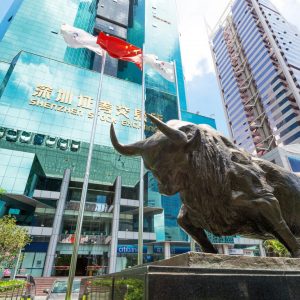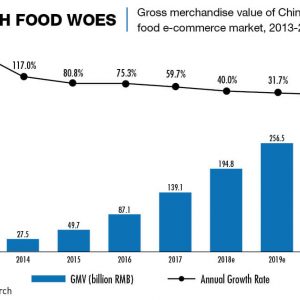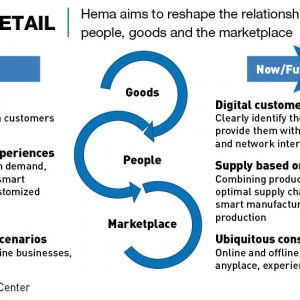China’s businesses are increasingly looking to list on domestic exchanges

After a record year of Chinese companies listing on US stock exchanges, June saw Didi Global, China’s largest ride-hailing operator, join the party with a $4.4 billion IPO. But scarcely had major shareholders had time to celebrate before regulators in Beijing hit the company with accusations that tanked its share price.
Within 48 hours of Didi’s listing, the Cyberspace Administration of China (CAC) said it had launched an investigation into the company. Two days later the once-obscure internet regulator ordered Didi’s mobile app to be pulled from local app stores, blocking new customers from joining the service.
China is turning the screw on domestic companies seeking to go public outside of China and dozens of mainland-domiciled businesses have since halted their planned IPOs in the US, including high-profile tech names such as social media and lifestyle platform Xiaohongshu, popular fitness app Keep, and autonomous driving startup Pony.ai.
And while the boom in Chinese firms floating in New York has come to a sudden halt, IPOs on bourses in Shanghai and Hong Kong are surging. It’s part of a great homecoming, a fundamental shift in listings from the West to the East.
Beijing’s clampdown on foreign listings forms part of a broader crackdown on internet platforms and the tech tycoons they have enriched. It marks a major turning point in the long-running success story between capital-hungry Chinese firms and deep-pocketed American investors—putting more than $2 trillion in shareholder wealth on the line.
“Foreign stock investors who used to look to these types of Chinese stocks for dependable growth and often huge gains will now be very wary of betting on Chinese stocks,” says James McGregor, Greater China Chairman for consulting firm APCO Worldwide.
Taking stock
The flow of Chinese companies to New York over the past few decades has long been immensely profitable for all involved—from the founders who became billionaires overnight and the Wall Street banks that underwrote the deals, to early investors and new shareholders.

Going public in the US has paid off for Chinese tech companies since China.com Corp. became the first to float in the US in July 1999, rewarding them with clout and capital. “Listing a foreign company in New York is incredibly prestigious, which is very relevant in a Chinese context,” says Paul Krake, founder of Hong Kong-based consultancy View from the Peak. “It’s also a pragmatic way for those with global ambitions to circumvent mainland capital controls.”
The money flow was uninterrupted in the first half of this year—of the 78 tech, media and telecoms companies (TMT) in China that went public in the first half of this year, 20 listed in the US and raised a combined RMB 65.2 billion ($10.1 billion). That was a major leap over H1 2020, when only nine IPOs were launched. Mainland TMT listings raised just RMB 38 billion ($5.9 billion) in H1 2021. As of early May, there were at least 248 Chinese companies listed on the three largest US exchanges with a combined stock market value of $2.1 trillion. This compares with 217 companies and a total market capitalization of $2.2 trillion in October 2020.
Chinese enterprises have long had additional reasons besides prestige to choose New York over Shanghai, Shenzhen or Hong Kong. Wall Street has a longstanding acceptance of unprofitable startups and an inclination to hand juicy valuations to tech companies, according to Paul Gillis, a professor at Peking University’s Guanghua School of Management. “It’s very easy to raise money from listings in the US because there’s greater expertise in technology there, while the US has more relaxed corporate governance standards.”
IP-No
But Beijing has now moved to stem the flow by framing rules to ban internet companies whose data poses potential security risks from listing outside the country—including in the US. In early July, the Communist Party’s Central Committee and the State Council jointly issued opinions to crack down on illegal activities in the securities market. The document vowed to strengthen oversight of companies traded abroad and set up a supervisory system to address risks and emergencies related to foreign-traded companies, especially around data security.
The CAC meanwhile, has spearheaded the government’s scrutiny into IPO candidates by inserting itself into the offshore fundraising approvals process. The agency proposed new rules in July that would require companies with more than one million users to undergo a cybersecurity review if they are looking to list overseas.
The China Securities and Regulatory Commission (CSRC) is drafting rules that could require offshore-registered companies to seek regulatory approval before selling shares in foreign markets, and there have been media reports that companies controlling large amounts of sensitive data may be banned from listing in the US altogether.
“The Communist Party is saying there is no national security without data security,” says Rory Green, chief China economist at TS Lombard. “These mainland firms listed in the US—particularly the big tech firms—are now classified as critical information infrastructure providers. They have such a big role in the Chinese economy, they’re essentially an infrastructure, and because of this, they need much greater supervision from a data security and a national security perspective.”
Recent action in Washington has contributed to souring what was previously a welcoming environment for Chinese listings. For years China has refused to allow the US Public Company Accounting Oversight Board (PCAOB) to examine the audits of Chinese companies’ financial statements and the auditors charged with reviewing them.
“It was a halfway compromise that didn’t work very well and both sides were muddling through,” says Martin Chorzempa, senior fellow at the Peterson Institute for International Economics. He points out that France and Belgium also had issues with PCAOB oversight but still managed to strike agreements with the US.
“The contradiction for a while now is that China hasn’t allowed the US to audit its companies from the Chinese side,” says Green. “This has been problematic because of a number of long-running accounting issues, particularly with fraud. Most recently it was Luckin Coffee but there have been many other fraudulent Chinese companies that successfully misled US investors.”
The issue came to a head near the end of 2020 after the US Congress passed bipartisan legislation that mandates foreign companies listed in the country to agree to an auditing inspection within the next three years or be delisted from American stock exchanges. The US Senate upped the ante this summer when it passed a bill trimming the deadline to two years. Then in late July, the US Securities and Exchange Commission halted IPOs by Chinese companies until they boost disclosures of risks posed to shareholders.
An additional reason for the US pushback is concern over companies that are backed or partially owned by the Chinese government, which could pose national security threats or be implicated in human rights violations.
The impact of the regulatory onslaught has been reflected in the slumping valuations of US-traded Chinese firms, with billions of dollars in market value wiped out. For instance, the market capitalization of Alibaba—arguably the poster child for Chinese internet’s might on US markets—has slumped to its lowest since October 2019. Meanwhile, the MSCI China Index, which tracks large and mid-cap Chinese companies, fell more than 12% in the first seven months of 2021. By contrast, the MSCI World Index has risen 15%.
Didi getting ahead of itself
The months-long US threat to delist mainland firms unless they open their books means it is unclear if Didi’s IPO at the end of June was the catalyst for China’s own regulatory crackdown. But the ride-hailing platform is undoubtedly the most-visible casualty of the increased acrimony, their shares were still trading at one-third lower than the IPO price in October.
Didi’s rush to go public put it in the crosshairs of regulators that had urged the company to delay its IPO until its cybersecurity could be vetted, says Gillis. “There were some valid concerns about Didi… I think Chinese regulators wanted to make sure their customer data did not become available overseas or to foreign regulators.”
Official fears of Didi’s data falling into the wrong hands were likely fanned by a 2015 study that used Didi’s data to track the travel habits of government officials. “That kind of information is something that China would quite reasonably not want to fall into the hands of foreigners,” says Gillis.
Paul Krake is unsympathetic over the regulatory assault on Didi. “They were a bad actor in all of this,” he says. Now the company’s missteps have created a major red flag for large companies also looking to list overseas—particularly ByteDance, which shelved US IPO plans after attracting regulator’s attention, only to subsequently announce its intention to list on the Hong Kong exchange in early 2022. “I think it’s served notice that going forward these companies need to toe the line and do these things properly.”
The Didi fiasco helps explain American discontent over the risks of China listings on US exchanges, and the need for Chinese firms to better inform investors about regulatory and political risks. In Didi’s case, it has claimed it had no prior knowledge of the CAC’s probe and has not commented on media reports it ignored regulators’ suggestions to delay its listing.
“What happened with Didi has really highlighted the frustrations, both in Beijing and in Washington, about how this process has been going up until this point. And it is leading to a shift,” says Chorzempa.
Coming back home
With the US IPO market now a danger zone for Chinese firms, companies are eyeing domestic markets, following a years-long effort by Beijing to elevate its exchanges.

Shanghai’s three-year-old STAR Market has gone some way to easing longstanding difficulties of going public in China, by introducing more inclusive and adaptable listing rules to support tech and innovative enterprises. The Nasdaq-style board is the first in China to permit a dual-class shareholding structure favored by Silicon Valley’s tech moguls.
In addition, the STAR Market’s adoption of a registration-based IPO system has been a “game changer,” according to Green—whittling down a review process that previously took up to two years, to as short as six months. “It’s a much faster process. China is enabling these tech firms to either list directly in China or at the very least conduct secondary share placements.”
The government has already replicated the registration system to Shenzhen’s ChiNext startup board, and aims to gradually roll out the mechanism to the rest of China’s stock market, which still uses a system based on regulators’ approvals.
Companies seeking IPOs can also look to the long-established Hong Kong Stock Exchange and Beijing has just announced the creation of a bourse to expand financing for innovative small and medium-sized enterprises who face growing hurdles to selling shares in the US.
Capital considerations
Stricter rules mean many US-listed mainland companies including Alibaba, Baidu and NetEase have carried out secondary listings in Hong Kong to hedge against risks. Green says dual-listed enterprises are in theory a safe investment for US investors as, in the event a company’s shares in New York are forcibly delisted, those shares could automatically be converted onto the Hong Kong Stock Exchange.
In practice, however, many large institutional investors are starting to prepare to buy shares in Hong Kong rather than in New York—potentially giving rise to a Hong Kong premium in companies’ share prices relative to New York.
The future for companies without secondary listings is more uncertain. “A probable market dislocation will be the big valuation gap between companies with secondary shares versus those listed only in New York,” says Green. “The latter will be much more vulnerable to a sudden regulatory change in either the US or China. There’s no fallback option for these smaller companies.”
The rancor raises the thorny question of why Beijing is curbing access to the world’s biggest capital markets. “There’s the feeling that reliance on US capital markets leads to vulnerability, and gives the US control. That’s something they’re worried about,” says Chorzempa.
McGregor points out that while government in the US serves business—sometimes to such an extreme extent that it shortchanges consumers—recent events in China have crystallized the notion that business there is expected to serve the government. “You can make money but you have to do it with a focus on what serves the government’s plans and objectives,” he says.
But talk that the schism between American capital and “China Inc.” is a step toward decoupling is overblown, argues Krake. He says that while the situation fits the hawkish narrative that China is intent on decoupling its companies from Western capital markets, the “reality is that Chinese companies are being delisted not because of decoupling but because they have different standards.”
Gillis agrees that regulatory misalignment is forcing the matter. “I think China should probably find a way to withdraw from US capital markets if it does not want to comply with US regulations. It’s completely appropriate for the US to deny access to its capital markets for any company unwilling or unable to comply. Does this mean what’s happening is decoupling? I’m not convinced.”
Journey to the East
While Beijing’s tightening grip has thrown a wrench into the listing plans of many mainland startups, the general sentiment is that IPOs will not remain at a standstill for long given the allure of the deeper capital markets, more streamlined listing processes, and a broader investor base in the US. “I think we will see a return to US listings late this year but the appetite for them is going to be subdued,” predicts Gillis.
Likewise doomsdays speculation in American financial circles that this presages the end of Chinese listings in the US are likely to be wide of the mark. But it is fair to say their continued presence on New York’s exchanges will be influenced by the geopolitical relationship between Beijing and Washington. The intransigence is not simply a matter of the regulators themselves—both the SEC and CSRC have signaled willingness to compromise—but of overall US-Sino ties.
At the same time, Beijing’s actions against Didi and on the broader regulatory landscape make its preferences clear—it wishes to see more capital raised on its own exchanges, within its purview and on the terms that it dictates. “Over the next five to 10 years, we will see continued decreased reliance on US markets and increased reliance on Chinese and Hong Kong markets, together with reforms that will basically merge the Hong Kong and Shanghai markets together,” says Gillis.
“The real question is if the US-China relationship is on an ever-declining path toward decoupling? We’re still looking for a floor, a new baseline for relations,” says Green. “I’m optimistic that it will not be a full-on decoupling, so from that basis, I believe there will still be Chinese companies listed in the US a decade from now.”




















